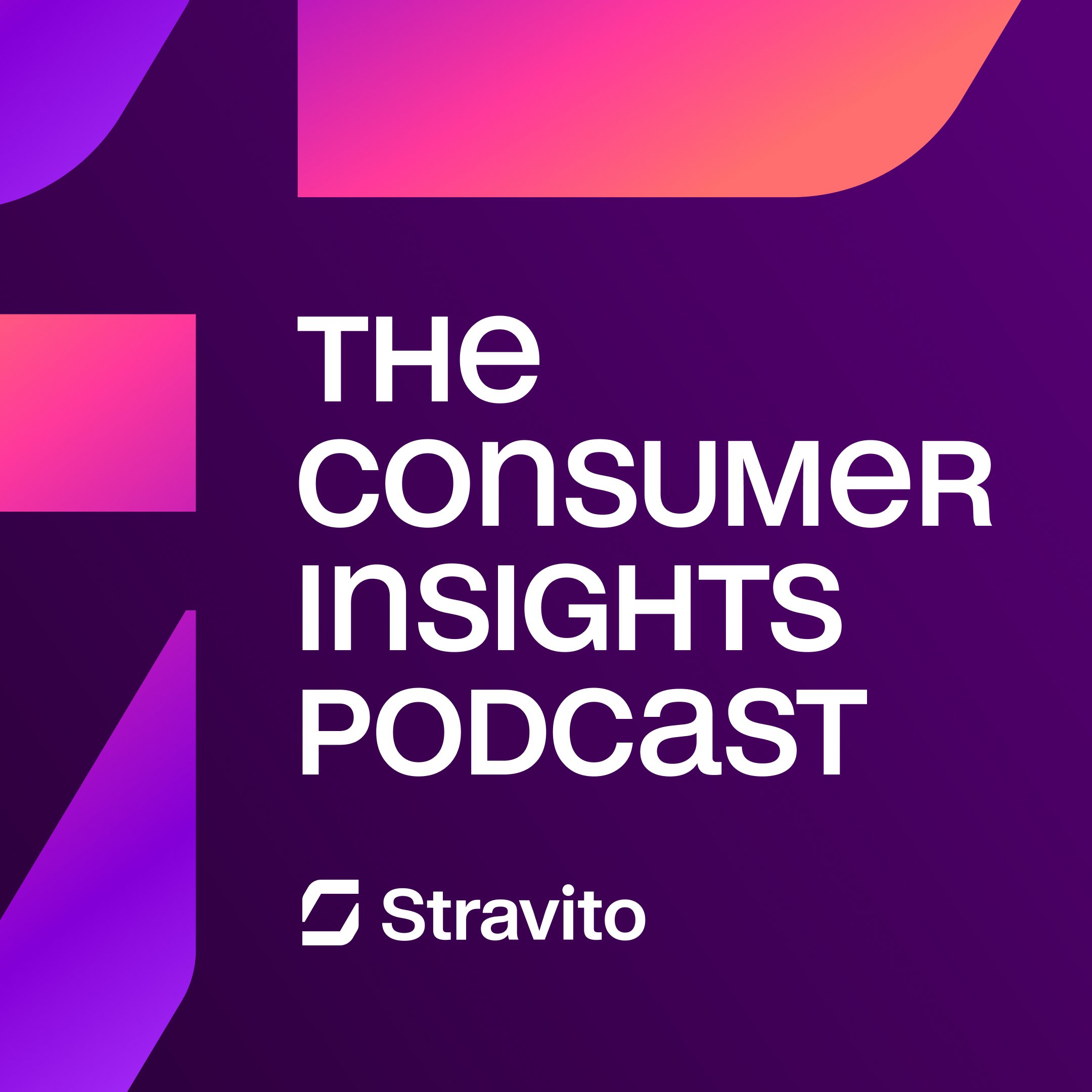Bridging the Gap Between Businesses and Consumers
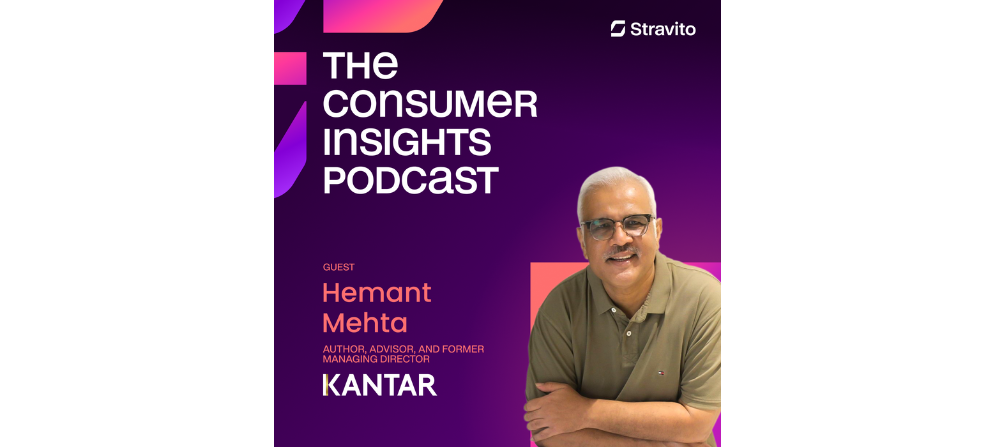
In this episode of the Consumer Insights Podcast, we speak with Hemant Mehta, author, advisor, and former managing director at Kantar.
Are you actually solving your consumers’ problems? Or are you just solving the problems you think you should be solving?
Impactful insights need context, and in order to create that context, you need to stay close to your consumers.
In this episode of The Consumer Insights Podcast, Thor is joined by Hemant Mehta, an author, advisor, mentor, farmer, entrepreneur, and former Managing Director of the Insights division, as well as Chief Strategy Officer for South Asia, at Kantar.
They cover:
- Why it’s crucial to contextualize insights
- 2 of the critical roles that insights professionals play
- The importance of advocating for a holistic perspective of business problems
- Key considerations when conducting research in local and hyperlocal markets
- What big brands can learn from local and hyperlocal brands
- How the industry has changed over the last 3 decades
- The DNA of a successful insights team today
- Why it’s crucial to do your homework before jumping into a project
- How insights professionals can seize opportunities and challenge the status quo
If you’re looking for a refresher course on how to bridge the gap between your business and your consumers, tune in to this episode of The Consumer Insights Podcast.
You can access all episodes of the Consumer Insights Podcast on Apple, Spotify, Google, or use the RSS feed with your favorite player. Below, you'll find a lightly edited transcript of this episode.
Thor Olof Philogène:
Hello, everyone, and welcome to the Consumer Insights Podcast. I'm thrilled to introduce today's guest, Hemant Mehta, author, advisor, and former managing director of the Insights Division, as well as Chief Strategy Officer for South Asia at Kantar.
Hemant has over 30 years of experience in the industry and has worked across multiple roles, business, and product categories. He's also the author of the book India in Numbers. Thank you so much for joining me today, Hemant.
Hemant Mehta - 00:00:56:
Pleasure. Thank you for having me join your podcast.
Thor - 00:01:00:
Hemant, we are very curious about you, so why don't you take a couple of minutes to tell us about yourself. Tell us about your journey, how you came to where you are today. How did it all begin?
Hemant - 00:01:12:
Okay, so we start from my childhood. So I have lived all over the place, both within the country and outside, and I ended up doing my engineering as my basic degree. If you want to know what topic did I graduate in engineering, I opted for Agriculture Engineering. Then it was normal to do an MBA, and I was lucky to get into a good school.
So when I joined the school, I realized that 80% of the task was really understanding gathering data, understanding data. So that's where I started enjoying that. So I graduated my Master's in Marketing and Advertising.
Then I got into Indian Market Research Bureau, or what's now, Kantar. It used to be we were modelled on the lines of British Market Research Bureau, BMRB, so we were the Indian equivalent or IMRB. That's where I started my career.
And over the course of three decades, I've been very fortunate. I've worked across all kinds of research services, be it consumer research, mostly in the CPG space. Then I moved into media, got into media measurement. So I set up the local Television Audience Measurement Service in India. It was a joint venture with Nielsen. And then I set up the video listenership audit. And yes, that's been my journey.
I decided to start going back to my previous love, which is agriculture. So I decided to call it a day at Kantar a couple of years back. And I am now trying to grow some good food. So I run a farm, which is a hydroponic-based farm, so trying to supply better food to whoever I can.
And besides that, I do some bits, or I still want to continue with my love for numbers and for marketing. So I do work with young companies, helping them in the go-to-market strategies, getting the right market and consumer fit, etc. And yes, of course, you mentioned during the pandemic, and when we were all locked in, I also found a little time to put together a book which is essentially all about India -unknown aspects or little-known aspects about it. So that's been my journey.
How Hemant defines an insight
Thor - 00:03:44:
Thank you so much. Now let's take that passion for growing and grow some knowledge here for our audience. And if we start with the foundations we always start out with going back to the core, going back to the concept of the insight. How do you define it?
Hemant - 00:03:59:
Insight? Actually, there are multiple ways in which one can look at it. I believe the real insight is not just the “Aha!” moment which says “Hey, this is something new and different.” But the insight for me is something which can be translated. It has a larger impact on both the business and the consumer. So that's really the insight.
Unless you contextualize to the business and the consumer need, that insight to me is just a finding, not really an insight.
I'm a quantitative researcher. I've been a quantitative researcher all my life, and you come across some numbers which give you some insight. But unless you contextualize to the business and the consumer need, that insight to me is just a finding, not really an insight. So insight is something that should be actionable, that can be activated, and that has a positive impact both on the consumer and the business.
On the importance of insights
Thor - 00:04:51:
I love that. And having spent so much time in the industry, why are they so important?
Hemant - 00:04:57:
Well, I firmly believe and I say not just because I made a living for 30 years of it, but the thing is that I do believe the role of the industry is really the bridge between the brand or the business and the consumer.
We very often tend to believe what we believe. Sitting saying, “I've got a product, it's solving a problem, it's going to add value to a consumer's life”. We often miss out whether a consumer actually has a need for it.
Does she really see that it's going to help alleviate her life? I might come up with the most interesting bit which I believe is interesting from my perspective, but does it engage or excite the consumer? I think that's really the key question, and I think that's where we come.
We often miss out whether a consumer actually has a need for it.
Does she really see that it's going to help alleviate her life? I might come up with the most interesting bit which I believe is interesting from my perspective, but does it engage or excite the consumer? I think that's really the key question, and I think that's where we come.
Second part is that a lot of times you need an external mirror. Somebody to put a mirror in front of you and say, “Hey, this is the reality of your business or your brand. This is what your end users are talking about”, and that's where we come in. We play an extremely critical role, in two ways. One is for the consumers to bring to them better products, better lifestyles, better services, whichever way we define.
And for the business, really to make things or provide things which their end consumer wants and which can make an impact on their lives. So I think our role is very, very critical even today in an age where we are swimming with data. I personally believe that the algorithms and machines are going to throw up insights, but nobody's validating them. You can't just act upon it without saying, "Hey, you know, does this really help you?" Or how do you verbalize it, that insight, in consumer language? And that's where the industry is always going to be relevant.
Creating change through insights
Thor - 00:06:52:
I absolutely love this. And throughout these years, could you give us a couple of examples when you've uncovered insights that have really led to massive change, leading to better products or better campaigns? Any specific examples you could share?
Hemant - 00:07:07:
So I'll give you a very uninteresting category from our context, which is the radio. So I used to work with one of the largest radio networks in the country in the city of Mumbai. Just for you and for all the audience, Mumbai is a very cosmopolitan city. We speak about four main languages, and the local language is a language called Marathi.
Now, this radio station always said it was at the cutting edge, would play the Bollywood, which is our staple music. And then they always had a trouble figuring out why in the morning hours between seven to eight, the ratings were very low, the audiences were very low. And they were absolute, they said, “We are not going to move away from our positioning as Hindi or a Bollywood station. We are only going to have our radio job start in English, and we are not going to consider anything which is old.”
We did some consumer visits, and we actually showed them videotapes of what people typically do at home during that hour. And what we found was that a lot of family would actually be listening to devotional music, which is not necessarily in Hindi.
And that was the “Aha” moment.
And this was where we started – we kind of cajoled them. We did some consumer visits, and we actually showed them videotapes of what people typically do at home during that hour. And what we found was that a lot of family would actually be listening to devotional music, which is not necessarily in Hindi.
And that was the “Aha” moment. When we said, “Let's test it out, let's do a music test, see how positively our listeners react.” And when they saw the findings, they actually changed the program.
So today it's a very solid block of audiences which come in in that time slot for them. This is one very small insight thing that we actually on our own we took the initiative, we went to about 20 different households who were core listeners of the station, trying to understand what do they do? We said, “Okay, we'll do virtually like an ethnography.”
But it was really easy because after 2 hours in multiple homes, we realized what they were doing. But we continued with it. And we actually took the videotapes, we showed it to the client, and they could see it for themselves, how people switch from devotional to the mainstream Bollywood music. And that really gave them the courage. And actually they implemented our recommendation saying you should have a devotional hour in the morning.
Why research partners need flexibility
Thor - 00:09:33:
I really like that example. And as someone with deep insight into the market research industry in India, what advice would you give to insights professionals looking to conduct research there?
Hemant - 00:09:45:
One of the things that I would tell them is, at least I can talk from the Indian perspective. Most of the insights teams are aligned to the marketing, and somehow the marketing folks kind of override them or force them to interpret or write beliefs which are from their perspective. In the sense that they want or what they would like to believe is really what they want to understand.
I think the marketing, the CMI folks, the insights folks, really need to give them a little pushback to say, “Hey, let's understand the issue holistically rather than very narrowcast the problem.” Because I see a lot of insights actually come in if you have marginally broaden the brief, you will see a lot more coming out of it. Rather than saying “I just want to know if my brand is not doing well”, tell me five reasons why it's not. But it's really if you were to expand that to say, “My brand is not doing well, let's figure out why the consumers are rejecting it.”
So if you expand them, give the freedom and flexibility to your research partners to really look at it more holistically, I believe that we can add even greater value than what we do today.
What big brands can learn from hyper-local brands
Thor - 00:10:58:
And you've previously written about local versus global brands, and particularly the appeal of local brands in markets like China, Indonesia and India. What do you think multinationals and global brands can learn from local or even hyper-local markets?
Hemant - 00:11:14:
First of all, they all need to understand India is not one country. We are 30 countries. We are more of the “United States of India”, if I were to use it loosely. So that's one. Second is that we are a Tower of Babel. If you see most of the national research projects that I would execute, typically I would ask questions in twelve different languages. One study translated into twelve languages.
So you've got to understand the cultural nuances. And that's where the local brands come in very well. They start out, they focus on a particular region, they know it very well, what's the consumer like, what makes her tick. And that's one of the biggest things.
So I can't come if I'm say, Unilever, and I say that I got this fantastic brand and I'm just going to do a pan-India launch and activation, the same communication, maybe it doesn't work. So you’ve got to appreciate that. That's number one.
You've got to understand the cultural nuances. And that's where the local brands come in very well. They start out, they focus on a particular region, they know it very well, what's the consumer like, what makes her tick. And that's one of the biggest things.
The second bit, which the local and hyper-locals do very well, is the speed to the market. They see an insight, they see an opportunity, they build the product out there in the time that a multinational would take double the time to really roll out a product because they've got their protocols to go through their own structures, to kind of go through the entire process.
But these are two things – people often believe that locals and hyper-locals win only on price. Believe me, it's not the case. You got premium local brands, which do really well. But the underlying message for everyone that I would say is locals understand their consumers, they understand the market. They are nimble, agile and quick to go to the market. And that's really one of the few ingredients of their success.
What's changed in three decades of insights
Thor - 00:13:04:
That makes a lot of sense. And throughout your career that has spanned over three decades, what are the some of the biggest changes you've seen in research and the insight space in that time?
Hemant - 00:13:18:
I think two things stand out for me. One is this whole technology coming in from, in our context, in a very slow pace. So we moved from paper and pencil, but the change thereafter has been dramatic.
The pandemic has only accelerated it. So with a lot of work, I mean, if I were to share some numbers with you, pre-pandemic, only 20% of the work in the country was online. Today it's actually 60%. So one is the technology which came in.
The second is the expansion of the different principle adjacent categories coming in. So you had psychology, sociology, ethnography coming in. You had neurosciences coming in. And the new kid on the block is variable science. So the way those principles have been absorbed or integrated into the research processes, adding a lot more value. So that two changes that I see.
The other change that of course, which I think happened everywhere, is the speed of delivery from a client expectation is phenomenal. When I started out, a client wouldn't blink an eye if I were to say that, “You know what, I need ten days to set up a focus group.” Today, on the 10th day, if I'm delivering the findings, the client thinks, “Oh, you're very slow”. Because the decision making has changed so dramatically. The expectation from the agency partners is you've got to keep pace with the whole digital businesses direct to my brands, direct to consumer brands or the eCommerce businesses. I mean, they're hyper fast, if I may use the word. And they expect the agencies to be equally fast. We are still not there. But we are trying our best to.
The DNA of a successful insights team
Thor - 00:15:09:
And just tying it a bit to what you just said about the skills and talents that are now kind of joined and are supporting that's grown so much. How do you believe that the right composition should be? What's the DNA of a successful insights team today?
Hemant - 00:15:27:
So I can't for the life of me say that you'll get one insights person with everything that you need. Today, you need someone who understands the brand, who understands the research process, and then you have specialists in the team. So you've got someone who can work along with the agency partners on big data, someone who can work on the social data. So the Insights team, in my mind is today a combination of people and an insight professional needs to work with them. To bring in the best and deliver the best to the client.
So I need someone who can analyze for me big data coming in, someone who can say, “Okay, the social listening is giving me this kind of insights, and let's work together. You've got your survey data, I've got data from big data or from the social data.”
Put it all together and that's really the success. So being adaptable, being able to work with different kinds of people who have their own skills and own strengths, I think is a big, big ask today. I remember when I started my career, we were seen as geeks who just like being with numbers. Or if I was a qualitative researcher, I was going through discussion transcripts of the discussion. But today, technology has come in to help me do a lot of that heavy lifting. But the partnership that I need today is not what I saw when I started my career. So I need to partner with people with diverse skills, with diverse specialization for the same project, for one project, if I want to do absolute justice to my client.
Hemant's best career advice
Thor - 00:17:09:
And a lot of people in our audience are at completely different stages of their career. But having spent more than 30 years in the insights industry, I think a lot of people would value, in the audience, the best career advice you've received. What would you say that that best career advice that you've ever received has been?
Hemant - 00:17:27:
I would say one thing. So my mentor or the person who was my first boss, her name is Katie. All that she made me do has been the anchor for today. She always said, “Don't jump into a project. Study as much of the category and brand as you can.”
And today, we are so fortunate that sitting on my desk, just going through the internet, I can pick up so many nuances and understanding of the brand. We never had when I started– there was no social media or no social listening. Today, I would advise do your homework equally well. You're fortunate, you'll do it very quickly.
But that will help you do justice to the client. It will help you to build an equation with the client because you got to know, I would say, 80% of what the client or the brand manager knows about the brand, and it's very easy to do that. So prepping for the project by getting the category and brand understanding is really critical.
How insights professionals can challenge the status quo
Thor - 00:18:31:
That is really great advice. And continuing on the topic of advice, what opportunities do you think exist for insights professionals if they want to make true business impacts, if they really want to challenge the status quo?
Hemant - 00:18:47:
Plenty of options, if you ask me. Today, as an insights professional, if I can spend time with every organization that has social listening or command centers or whatever names that begin, it just means just a walk across and looking at it. A lot of companies, say like Unilever in India, they have live feeds coming in from actual stores of. You observe, you see what the consumers are doing and draw your insight and just present it. Before the marketing guys know it, you share something which is of value to them. You already move from being just a support or a partnership to being a true partner. So there are lots of opportunities, insights which are available.
Second bit is again I would say the same thing that I mentioned about being a good researcher. You're doing your prep. The same thing – if you are curious and you are looking at a larger context of the business that you are partnering with and see what is happening and keep on sharing that, that itself is of great value, both to you and to the marketing team that you are supporting.
Challenges on the horizon
Thor - 00:20:01:
I absolutely love that and it's reminding us of how important it is to stay close to that on yourself. On the flip side however, there are of course a lot of challenges and if you would highlight a few of those which one would you say are the bigger ones for the insights industry and the wider industry in general in the near future?
Hemant - 00:20:23:
I think the low end is actually two things. One is this rush, the speed with which we want to make decisions. I don't think we are giving enough time to ourselves to be able to look at the data in a very minute way, and sometimes I feel those decisions are being taken or insights are being pulled out in a rush. So that worries me.
Now in that high churn environment, what happens is you're not able to share the knowledge that you built in about the product, about the brand that you're servicing. So there's some amount of loss of that knowledge, learning which happens.
And the other aspect which worries me, and maybe this is more from the part of the world that I come, where you’ve got a lot of turnover of people. So if I operate in market research – as an industry in India typically has 20% attrition rate both at the clients as well as within the agencies. Now in that high churn environment, what happens is you're not able to share the knowledge that you built in about the product, about the brand that you're servicing. So there's some amount of loss of that knowledge, learning which happens.
So these are some of the things which worry me, and of course I wish we would get the place on the board, get to meet the senior folks more often than what we do today because I think at times I believe that they need outside in perspective of what we know about the consumer. Give us an opportunity to tell you about it. I'm sure they go through tons of summaries of key work that the rest of the teams are doing, but let's hear it from the consumer experts and we are in far more in greater touch with consumers than, dare I say with the CMOs and the CX the whole C-suite in that sense.
Who Hemant would love to have lunch with
Thor - 00:22:13:
I absolutely love this. Unfortunately, Hemant, we're getting to the end of our conversation here today and as much as I would have loved to continue, I only have one last question for you and it's a question I love to ask, which is who in the world of insights would you love to have lunch with?
Hemant - 00:22:31:
Oh, I would love to have lunch once again with my ex-boss from Kantar, Eric Salama. And not just to learn more about market research, but there are very few people who are so interested in such a diverse set of information about things in life in general. And I love the way he is able to bring that to a project or to an issue that we might be working upon for a client. So I'd love to go on lunch with Eric anytime.
Thor - 00:23:08:
Fantastic. And I will definitely try and find a way to eavesdrop on that lunch because I'm sure there would be a lot of learnings for me too.
Hemant - 00:23:16:
Pretty sure.
Summary
Thor - 00:23:18:
This has been such an incredible conversation, Hemant. Your perspective is truly unique and if I replay our conversation, there are a couple of insights I'd like to play back to the audience.
I think in terms of definitions, don't confuse findings with insights. And remember that the role they play is that in a lot of cases you need an external mirror, and insights can provide that. The real insight is something that goes beyond the “Aha!” moment- it's a translator that allows for an impact on the business and the consumer. And I think that the role of the insights industry is the bridge between the brand and the consumer.
You reminded us that the world has changed so much in India pre-pandemic online penetration 20%. Today, 60%. So, as a word of advice, and great advice you have been given and that you've shared with the audience today, don't rush, don't jump into a project. Do your homework thoroughly before. I know that I've learned so much from talking to you today, and I'm sure our audience has as well. Thank you so much for joining me.
Hemant - 00:24:35:
Thank you for having me on the show.
Related Content
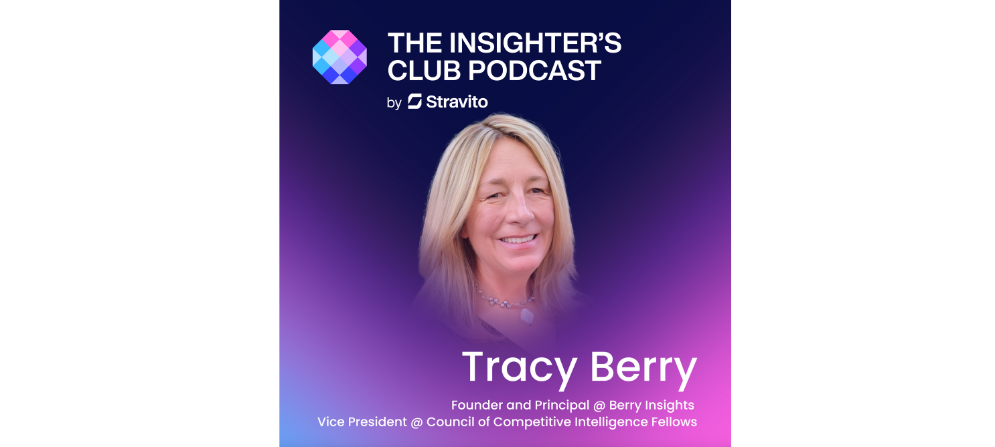
From Signals to Decisions
In this episode of the Insighter's Club Podcast, Ross is joined by Tracy Berry, Founder of Berry Insights, Vice President of the Council of...
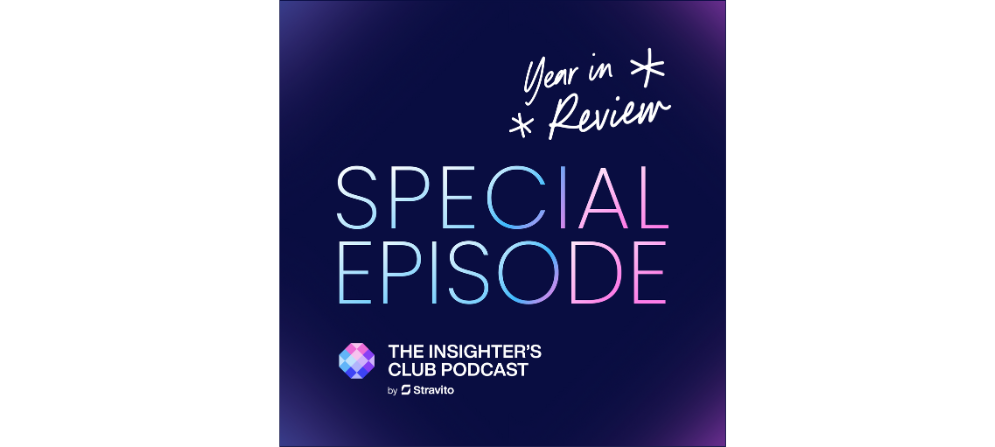
2025 Year In Review
In this special end-of-year episode of the Insighter's Club Podcast, Ross is joined by Stravito Founder & CEO Thor Olof Philogène.
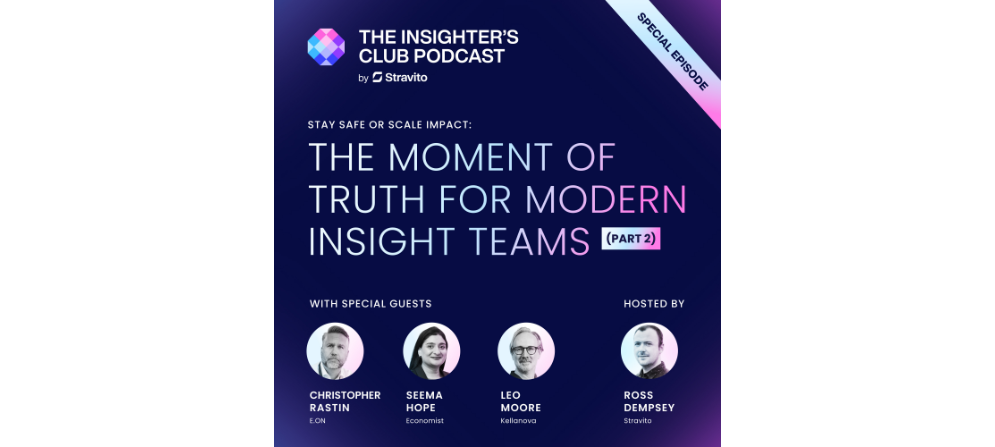
Stay Safe or Scale Impact: The Moment of Truth for Modern Insights Teams (Part 2)
In this special episode of the Insighter's Club Podcast recorded live at the Stravito Customer Summit in Paris, Ross is joined by Seema Hope (VP of...
Subscribe to the latest podcast updates
